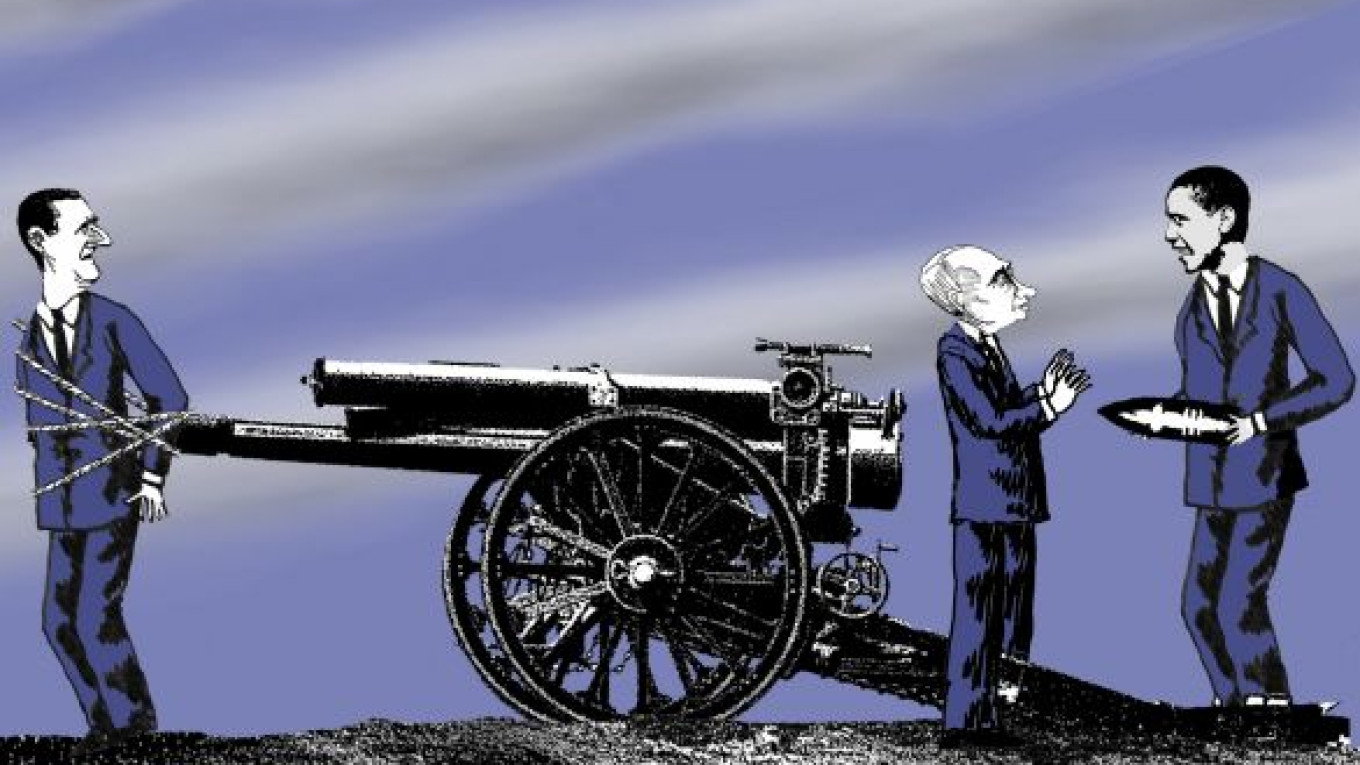By claiming for weeks that "doing nothing" is the only alternative to a "limited" military response to the reported use of chemical weapons by the regime of Syrian President Bashar Assad — plainly stated, an illegal U.S. war against a nation that has not threatened Washington — the administration of U.S. President Barack Obama has continued Washington's post-Cold War disdain for diplomatic solutions to international crises. It has done so in the same triumphalist, America-as-indispensable-nation spirit that inspired the Bill Clinton administration's bombing of Yugoslavia in 1999 and the administration of George W. Bush's disastrous war in Iraq, both carried out without a United Nations mandate and over Russia's protests.
But Foreign Minister Sergei Lavrov's proposal Monday to put Assad's chemical weapons under international control makes clear that a diplomatic solution to the Syrian crisis is eminently possible. Obama called the initiative "potentially positive," while Washington's powerful pro-war and anti-Russian lobbies rejected it, as usual, as bogus and "very bad news."
Obama should not dismiss diplomacy before it is tried and should work closely with Russia to help solve the Syrian crisis.
The best approach has always involved both the UN Security Council and Moscow. Until now, the Obama administration has refused to pursue this path on the grounds that President Vladimir Putin, whom it has repeatedly denigrated, would use Russia's veto to block any military action. Thus, the Obama administration is, in effect, dismissing diplomacy before it is even tried.
The Obama administration should now fully endorse an emergency session of the UN Security Council without calling for immediate military measures. The session should begin instead with a full examination of conflicting claims as to who used chemical weapons in Syria— the Assad regime, as the White House insists, or Syrian insurgents, as the Kremlin suggests. All of the evidence, including the findings of the recent UN inspection mission, would be weighed by the UN Security Council.
Even if the evidence points conclusively to Assad, a compelling nonmilitary approach remains, if it is backed by the U.S., Russia — whose leading political and logistical role is essential — and the UN. Assad should be given a limited period of time to place all of his chemical production facilities and stockpiles under joint UN-Russian control. Moscow and UN specialists, both of whom have ample knowledge and experience in this regard, would then begin the long, complicated process of destroying these installations and weapons, whether on-site or outside of Syria, as has been done in other countries. In addition, Assad would sign the 1993 Chemical Weapons Convention, which was signed by 189 countries, and bans the production and use of such weapons and requires their destruction.
Influential segments of the U.S. political-?media establishment will vehemently object to any central role for Russia. For years, they have demonized Putin rather than analyzed what he actually says about international developments. But given his long-standing argument that aggressive U.S. policies have been fostering dangerous instability and jihadism in the Middle East, not democracy, there have been good reasons all along to think that Putin would be receptive to this kind of diplomatic approach to the Syrian crisis. After Lavrov's proposal Monday, there can hardly be any doubt. If nothing else, Putin's insistence on a peaceful resolution should be tested.
Certainly, the advantages of U.S.-Russian cooperation would be enormous. It might serve as a turning point in international relations. The U.S. would avoid a military action that is likely to kill many more innocent Syrians without eliminating Assad's chemical weapons capacity and inflaming Muslim and Arab opinion against the U.S. It would also undercut recently empowered moderates in Iran, do nothing to end Syria's civil war and possibly make a negotiated settlement even less likely, create yet another U.S. precedent of unsanctioned wars for others to imitate, and further the perilous drift toward a renewed Cold War between Washington and Moscow.
Instead, a joint U.S.-Russian diplomatic effort at the UN could restore the necessity and legitimacy of the Security Council, revive the joint plan for a Geneva peace conference on Syria, repair the needlessly damaged relationship between Obama and Putin, and lead to fuller cooperation in the fight against international terrorism and in other dangerous conflicts that lie ahead.
This opportunity for a nonmilitary resolution of the crisis must not be lost. It is a major test for both U.S. and Russian leaders, especially Obama, who once called for a "new era of American diplomacy" but has yet to act on that promise.
Stephen F. Cohen, professor emeritus of Russian studies and politics at New York University and Princeton University, is author of "Soviet Fates and Lost Alternatives: From Stalinism to the New Cold War." ?Katrina vanden Heuvel is publisher and editor of The Nation. This article appeared on Thenation.com
A Message from The Moscow Times:
Dear readers,
We are facing unprecedented challenges. Russia's Prosecutor General's Office has designated The Moscow Times as an "undesirable" organization, criminalizing our work and putting our staff at risk of prosecution. This follows our earlier unjust labeling as a "foreign agent."
These actions are direct attempts to silence independent journalism in Russia. The authorities claim our work "discredits the decisions of the Russian leadership." We see things differently: we strive to provide accurate, unbiased reporting on Russia.
We, the journalists of The Moscow Times, refuse to be silenced. But to continue our work, we need your help.
Your support, no matter how small, makes a world of difference. If you can, please support us monthly starting from just $2. It's quick to set up, and every contribution makes a significant impact.
By supporting The Moscow Times, you're defending open, independent journalism in the face of repression. Thank you for standing with us.
Remind me later.


